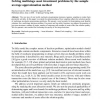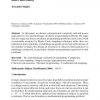100
click to vote
MP
2002
15 years 1 months ago
2002
In this paper we consider stochastic programming problems where the objective function is given as an expected value of a convex piecewise linear random function. With an optimal s...
120
click to vote
CCE
2004
15 years 1 months ago
2004
A large number of problems in production planning and scheduling, location, transportation, finance, and engineering design require that decisions be made in the presence of uncer...
111
click to vote
ORL
2006
15 years 2 months ago
2006
In this paper we derive estimates of the sample sizes required to solve a multistage stochastic programming problem with a given accuracy by the (conditional sampling) sample aver...
107
click to vote
MP
2006
15 years 2 months ago
2006
We show that for even quasi-concave objective functions the worst-case distribution, with respect to a family of unimodal distributions, of a stochastic programming problem is a u...
121
click to vote
MP
2006
15 years 2 months ago
2006
Stochastic programming is the subfield of mathematical programming that considers optimization in the presence of uncertainty. During the last four decades a vast amount of litera...
110
click to vote
MP
2006
15 years 2 months ago
2006
The vast size of real world stochastic programming instances requires sampling to make them practically solvable. In this paper we extend the understanding of how sampling affects ...
115
click to vote
MP
2006
15 years 2 months ago
2006
Abstract. Traditional stochastic programming is risk neutral in the sense that it is concerned with the optimization of an expectation criterion. A common approach to addressing ri...
107
click to vote
MP
2006
15 years 2 months ago
2006
Monte Carlo methods have been used extensively in the area of stochastic programming. As with other methods that involve a level of uncertainty, theoretical properties are required...
123
click to vote
MP
2008
15 years 2 months ago
2008
In this paper we discuss computational complexity and risk averse approaches to two and multistage stochastic programming problems. We argue that two stage (say linear) stochastic ...
104
click to vote
ANOR
2006
15 years 2 months ago
2006
To solve a decision problem under uncertainty via stochastic programming means to choose or to build a suitable stochastic programming model taking into account the nature of the r...



